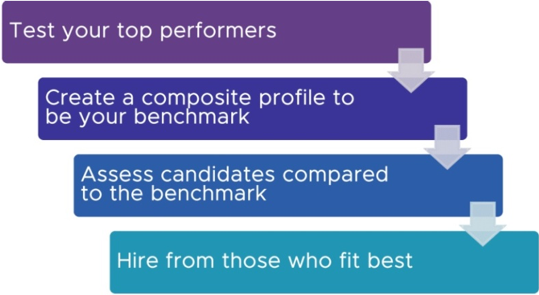Creating a Challenger Sales and Marketing effort in your business is not an easy task. In my last post, I suggested two key things a CEO should do to try to implement a Challenger Sales and Marketing team in their organization: 1) Employ the right people, and 2) Persistently support them.
In this post, I will expand my thoughts about employing the right people.
In the last parts of “The Challenger Sale” by Dixon and Anderson, they discuss the nature of the leaders who make successful Challenger Sales Managers.
They cite management skills such as integrity, reliability, and listening skills as necessary traits as these are important in any management position, not just sales management.
Candidate Selection is the First Step
If you are creating or expanding your Challenger sales team, I believe you need to be very concerned about the people you hire. I am a big fan of psychological testing in a hiring process. This is especially true for a  critical hire.
critical hire.
At the risk of showing my age, I will confess to you the first testing process I ever used was a test intended for the selection of officers in World War II. (Yes, it was really old)
WWII was a time when a team had to scale rapidly and the military relied on a testing process, however flawed it was, as part of the process to select leadership. The “other choice” was much worse.
In Strategyzer terms, testing had a strong value proposition.
In comparison to testing products available on the market today, it was simplistic. The company where I worked used the same test for all management positions. There was no variation in the test for engineers, salespeople, accountants, or managers in operations. All took the same test.
My role at the time was to manage engineers. After a few uses of the tool, I came to realize the best candidates for me had high intelligence (above 90th percentile), and decisiveness (which I associated with getting things done). What didn’t matter very much was introversion versus extroversion and social ability unless it was at either the end of the scale.
Not everyone in my company agreed with the test or the testing process, usually because they didn’t like their own scores. (This is a point to remember). But my personal opinion was supportive.
One form of criticism was that a reliance on the test might result in a manager discarding a candidate which might actually be a fit – in other words, a false negative. I agree that was a possibility. On the other hand, my experience was the test never gave me a false positive. I had a high correlation between test results, and high performing employees.
Today’s Tests Are Based on Better Science
I have two test recommendations for you to consider as you develop your sales and marketing teams: PXT Select from Wylie and SmoothHiring from ClearFit. I am familiar with both of these but there may be others.
Do your diligence on the tests you select. Some tests like DISC and Myers-Briggs may provide insight into behaviors but, in my opinion, they do not get down to the specifics about who you should, or should not, hire.
The science for PXT Select and SmoothHiring is solid. Both test for personality traits and interests. Both tests are administrated online. I do not recommend testing online for intelligence or cognitive ability. It’s too easy to look up the answers you need. If you want to test for this you should do it onsite where you can control the environment.
PXT Select is distributed through partners who assist you with the mechanics of the test as well as interpretation. It is a sophisticated product. Not only do you get an assessment, you also get interview questions based on the results to assist you to validate the results of the test. Uniquely, I believe, it also advises you about how to interpret the answers you might get to the questions.
Typically, users use the test to choose between 2-3 final candidates in a search process. You pay for each test taken.
SmoothHiring is a SaaS product. Rather than test final candidates, the test is placed at the beginning of the search process. The application assists you to develop job descriptions, and then places the search on all the job posting boards you wish. Everyone who applies takes the test. All of this is done for a flat fee per posting per month, no matter how many candidates take the test, or how many people you intend to hire.
The app then advises you which candidates are the closest fit to your desired candidate profile. Said another way, this tool assists you to screen, in an unbiased way, the surge of applications so typical in many searches.
Both products come with standard profiles for typical positions,
Customization
If you want to build a Challenger team, I recommend considering a custom assessment profile rather than the standard profile. With both the PXT Select and SmoothHiring products you can develop custom assessment profiles.

There are two ways to do this. You can manually create the profile. But if you know you already have a good sample of Challengers in your organization that represent top producers, you can test them and let their composite scores serve as your template.
If you haven’t used testing in hiring before, I recommend you get a bit of assistance to begin. Many small and medium size businesses are not familiar with testing.
One of the benefits of creating a custom assessment profile is it causes you to consider your desired profile and subsequently adjust it later if necessary.
Over-reliance on Testing
The experts in testing will tell you that there are limitations to testing. For example, many of the questions provided to you in the PXT Select assessments are there to help verify the results of the test.
Don’t use testing as a substitute for other things you do in an interview process. Let your own interviews and instincts play a role. Background checks, reference checks, and a review of social media might also be considered. An on-site cognitive ability test could be useful in your assessment.
I had a colleague in a sales management role who did credit checks on candidates. This might seem counter-intuitive, but he liked candidates with debt. He knew if they needed the money their situation might serve to motivate for success in the job.
In you conduct an interview process without testing, you may also want to remain cognizant of the fact that candidates who profile as “relationship builders” will work to build a relationship with you. You will find them to be likable and pleasant, but not necessarily qualified.
Team Member On-Boarding
What you do after you hire a candidate may be as important as the selection process.
If you are building a Challenger team, then knowledge about your products, terms and conditions, pricing, online content, and industry is essential. Challenger sales teams strive to be the most knowledgeable in their industry, something which cannot be faked.
Clearly, your top sales and marketing people must be good managers and mentors if they want to “teach the teachers”.
The best practices for on-boarding begin with a plan. What is accomplished on the first day? What is accomplished the first week or the first month? What is the measure of success for your on-boarding? How are people trained, tested, and evaluated in your on-boarding process?
How do you decide someone you hired is not a fit? Do you have a staged on-boarding process? Does a new hire need to master one stage before they go to the next?
 About the Author: Bob Kroon is a coach for high-performing Founders, CEO’s, and Owners. He founded Expeerious, LLC (expeerious.com) in 2015 to exclusively focus on coaching the success of Top Executives. For over 25 years, Bob served variously as CEO, COO, Division President, and Group Vice President.
About the Author: Bob Kroon is a coach for high-performing Founders, CEO’s, and Owners. He founded Expeerious, LLC (expeerious.com) in 2015 to exclusively focus on coaching the success of Top Executives. For over 25 years, Bob served variously as CEO, COO, Division President, and Group Vice President.
The majority of his career was in manufacturing durable goods. Bob is an enthusiast and practitioner of Lean Thinking since 1986. He also has broad skills in M&A including financial modeling, deal structure, diligence, and post-close integration.
Bob’s current clients are diverse and include businesses in healthcare, agricultural products, robotics, luxury goods, and education.
To learn more about how Bob coaches and thinks, you can find over 200 questions he’s answered on Quora. Visit his website at: www.expeerious.com for additional blog posts.

